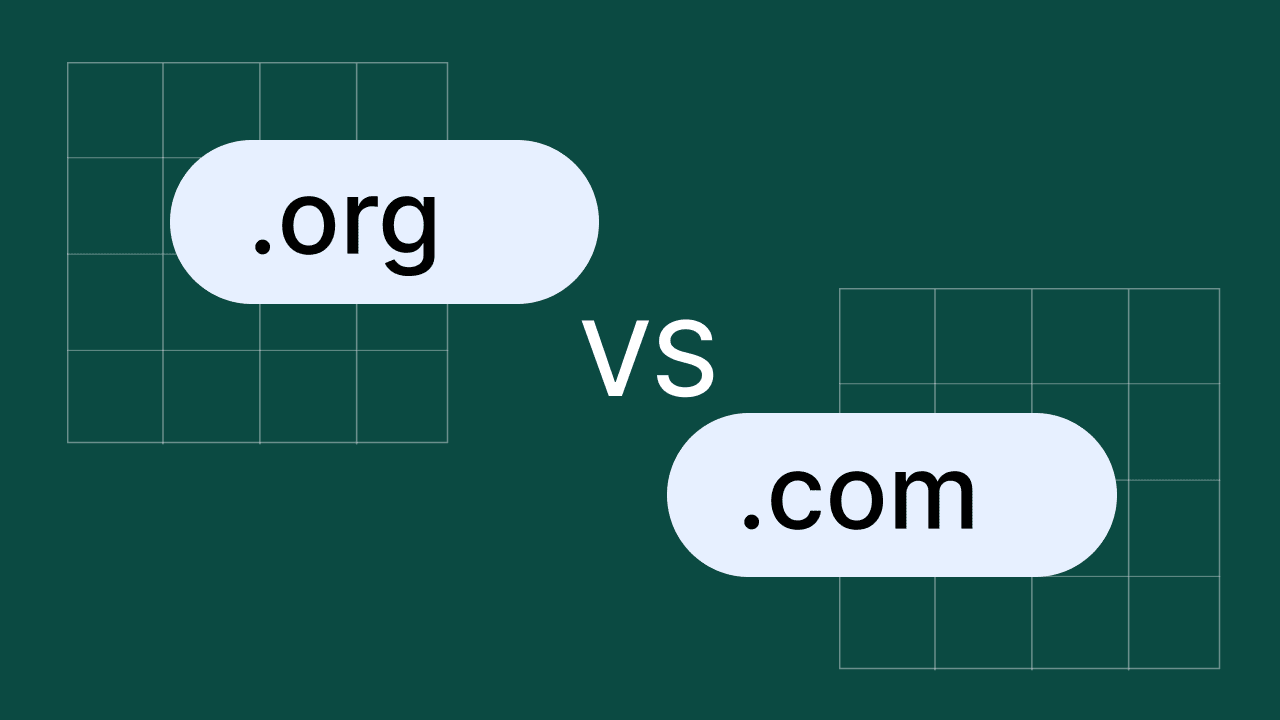Key takeaways:
- Your domain extension influences how visitors perceive your site—.com is seen as business-oriented, while .org leans toward trust, education, and purpose.
- .com often performs better in search, but .org gives you more options when availability or mission clarity matters.
- A mismatched domain extension can confuse your audience and work against your goals.
Choosing a domain name? You’ve probably run into the .org vs .com debate—two familiar domain extensions that signal very different things to your visitors.
.com was originally meant for commercial businesses, and .org for nonprofits and community groups. Both are open to anyone, but the extension you choose still shapes how people see your site.
In this guide, we’ll break down the differences between .org vs .com, explain who each is best for, and help you decide which domain extension fits your goals. But before that, let’s get to the tiny details first.
What is a domain extension and why does it matter?
A domain extension is what you see after the dot in a web address, like .org or .com . Also known as a top-level domain, it helps organize websites by purpose or industry.
Picking the right one can help you look more trustworthy and clarify what your site offers before your visitors even click.
Now, let’s unpack the difference between .com vs .org.
What is a .org domain used for?
The .org domain stands for “organization.” It started in 1985 as a home for nonprofit organizations, charitable organizations, and community groups focused on education, advocacy, and public service. Today, anyone can register a .org domain extension, regardless of whether the website is tied to a nonprofit or a for-profit company.
While .org websites were once exclusive to mission-driven groups, the extension has evolved. It’s now used by educational institutions, open-source projects, and even for-profit businesses. In fact, more than 20 million .org domains are registered worldwide to date.
So, if your target audience is drawn to public service or charitable work, a .org domain can support that image. Here’s a quick look at the pros and cons of using a .org extension:
Pros:
- Strong association with nonprofit organizations and public trust
- More available than .com, so your desired domain name might be easier to get
- Can help attract cause-focused or education-driven users
- Perceived as neutral, helpful, or informative by default
Cons:
- May confuse users if your content is commercial or sales-driven
- Might not appeal to search engines for product-focused content
- Not ideal for eCommerce stores, especially if you’re trying to appear transactional
- Could limit your ability to brand as a commercial business
.org fits the cause. But what if your goal is broader reach, recognition, and revenue? Time to break down .com.
What is a .com domain used for?
The .com domain was first introduced in 1985 as a top-level domain meant for commercial businesses, which is where it gets its name (“com” stands for commercial). Over time, it became the default choice for all types of sites, including online shops, professional websites, and personal brands.
There are over 296 million .com domains currently registered, and that reach gives it a natural edge in search rankings, brand trust, and visibility. If you want a domain name that instantly signals credibility for both users and search engines, .com remains the top choice for many profit-driven brands and commercial organizations.
But high demand comes with trade-offs. As most perfect domain names are taken, it can be tough to find one that fits your brand. Let’s take a look at what works and what doesn’t for this domain extension.
Pros:
- Universal recognition across search engine results and user trust
- Backed by strong performance in search rankings
- Widely used by commercial entities and for-profit businesses
- Great for general purpose websites, personal brands, and online stores
Cons:
- Many short or memorable domain names are already registered
- Often more expensive than other domain extensions
- Doesn’t always reflect a specialized mission like a nonprofit organization
- High competition makes branding and domain availability harder
Fun fact: .com still leads the internet, and it makes up 37.87% of all domain registrations worldwide. That dominance fuels both its popularity and scarcity.
What are the differences between.org vs .com?
Even a small detail like your domain ending can impact user trust, branding, and your search engine optimization performance. Here’s a quick side-by-side comparison of the two most common domain extensions: .com and .org.
| Feature | .com | .org |
| Purpose | General-purpose Ideal for selling, promoting, or professional presence | Best for nonprofit organizations, advocacy, and educational missions |
| Typical users | eCommerce stores Bloggers Tech startups Personal websites | Charitable organizations Schools Open-source projects NGOs |
| Branding | Seen as versatile and mainstream—can suit any business or website development model | Niche-specific Signals transparency Mission alignment Credibility |
| Trust level | Instinctively trusted due to familiarity and widespread use | Viewed as more transparent, but less common for for-profit companies |
| Availability | Often limited Many names already taken or sold in aftermarkets | More available due to lower demand and narrower use cases |
| Visibility | Benefits from user trust and familiarity, which can boost click-through rates and visibility | Can rank just as well if the content matches search intent and topic relevance |
| Global reach | Universally recognized across different countries and industries | Typically associated with local or cause-driven use |
| Cost | Often priced higher from strong demand and brand positioning | More budget-friendly, especially for startups and mission-driven groups |
Availability, cost, and the value of the best domain extension
Many of the best .com domain names are already taken, so you may need to get creative—or look elsewhere. A .org domain name extension often has more availability and lower upfront cost.
If your top choice is off the table, don’t worry. There are smart alternatives worth considering. You might still have a shot at buying that taken domain.
Some common extensions may appear in search results just as well as a .com, depending on the site’s content and web hosting quality. But for credibility, especially with tech companies, go with the one that people are used to seeing in the address bar and makes sense for your niche.
How domain names influence branding and perception
What your domain ends in can change how people perceive your brand. Now, what happens if your domain sends the wrong message? Here are some possible scenarios:
- A .org domain name used for selling products might confuse or alienate buyers.
- A domain extension that doesn’t match your site’s intent can weaken your message.
- Some domain names carry baggage from previous use, which may hurt trust.
- A mismatched top-level domain can make your content feel out of place.
- Even a trusted domain registrar can’t fix poor extension choices.
- Using a .net domain for a blog or nonprofit may seem outdated.
- Visitors may misjudge the purpose of your site based on your .org domain.
- Your domain name extension can affect first impressions, especially for new audiences.
- The wrong domain name can send traffic elsewhere or cause confusion.
- Your site might miss its mark if users expect something different from your top-level domain.
That’s why picking the right extension matters. It guides how people see your site right from the start.
So, which is better, .org or .com?
Both .com and .org extensions work well. It simply depends on your site’s purpose. If your focus is business, sales, or a broad audience, .com is usually the go-to. If your goal involves community, education, or advocacy, .org might better match the message you’re sending.
If you’re not sure which domain extension fits your goals, use this checklist to help you decide between .com and .org:
Choose .com if:
- You run a for-profit business or online store
- You want a general-purpose website with wide reach
- You aim for a polished, familiar, and professional look
- You need strong search rankings and SEO visibility
- Your audience includes mobile users or global visitors
Choose .org if:
- Your site supports a nonprofit organization, community, or mission
- You’re building trust around education, public resources, or advocacy
- You’re okay with a domain that’s more niche in appeal
- A .com extension is taken or doesn’t reflect your brand
- You’re targeting charitable organizations or community groups
Tip: Want full control? Register both .com and .org versions to keep your brand secure and avoid confusion.
What about .net and other domain extensions?
While the .org domain extension and .net domains were once tied to nonprofits and network-related sites, that distinction doesn’t really apply now. Today, many websites use these alternatives when domain names on .com are unavailable.
Just keep in mind that domain extensions themselves don’t directly affect search engine rankings. However, unfamiliar or uncommon extensions might affect how users perceive your site, which can influence trust and click-through rates.
For more tips, check out our blog, How To Choose the Right Domain Name for Your Business, to help you find the right domain extension.
How to get a free .com or .org domain name with Network Solutions?
If you’re planning to register a .com or .org domain soon, Network Solutions offers a way to get started without paying extra upfront. When you sign up for an annual hosting or website builder plan, you get one free domain name with extensions like .com and .org.
This offer covers your domain for the first year of your plan and doesn’t apply to renewals or monthly terms.
It’s a practical way to claim the domain that fits your goals, especially if you’re already considering a hosting or website plan.
Explore plans at Network Solutions and get your domain name included.

Next step: Lock in your domain with a trusted domain registrar
Picking between a .com or .org domain is an important step in shaping your online presence. Generally, .com is best for businesses and commercial sites, while .org is suited for nonprofits and community-focused organizations.
If you’re still deciding which domain extension fits your needs, tools like our AI domain name generator make it easier to explore options, compare extensions, and check availability.
When you’re ready, go ahead and register the domain that feels right for you before someone else does.
Frequently asked questions
The answer to which is better, .org vs .com, really depends on your website’s purpose. The .com extension is the most popular and is usually used for commercial businesses or personal sites. The .org domain is traditionally used by nonprofits, charities, and organizations focused on public service or education. Neither is better overall. It depends on what fits your goals and audience.
Yes, you can use a .org domain for a business, but keep in mind that .org is mostly associated with nonprofit or cause-related organizations. If your business has a strong community or social focus, .org can work well. Otherwise, many businesses prefer .com since it’s more commonly linked to commercial enterprises.
Yes, you can sell products on a .org website. There are no restrictions on commercial activities for .org domains. However, because .org is generally seen as nonprofit-focused, some visitors might find it unusual for a business selling products.




